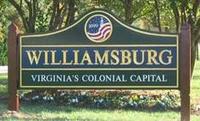"Hey New Girl, What Is History?"
"History is all of us. History is all of our stories." This was a question and response from the Lifetime Movie "Homeless To Harvard." When I heard those lines, I started thinking about Williamsburg. This being a town built upon the history of many of the Nation's Founding Fathers and a town that now thrives and depends on it's history for income. So, if this statement is true that we are all a part of history and our stories make up history, then why not include the 'history' of the homeless in Williamsburg? Since this plight has been in existence since the early days of Williamsburg’s settlement, aren’t they a part of this town's history as well? Understandably many people don't want those stories to be told or think if it is ignored, it won't be included in Williamsburg's bibliography; but if that was the way our ancestors looked at the lives here during their time, what would we be able to learn and read about? Just the good? Just their achievements? As Patrick Henry stated "I know of no way of judging of the future but by the past." Even during his time, Patrick Henry fought for the truth, good or bad "...it is natural to man to indulge in the illusions of hope. We are apt to shut our eyes against a painful truth, and listen to the song of that siren till she transforms us into beasts. Is this the part of wise men, engaged in a great and arduous struggle for liberty? Are we disposed to be of the number of those who, having eyes, see not, and, having ears, hear not, the things which so nearly concern their temporal salvation? For my part, whatever anguish of spirit it may cost, I am willing to know the whole truth; to know the worst, and to provide for it."
Even during the early days of Colonial Williamsburg, the poor and homeless had an important part in the making of history that the town today earns income through tourism. In 1755 Reverend Thomas Dawson of Bruton Parish sought the burgesses acknowledgement that "the number of poor people hath of late years much increased throughout the colony" and authorized all Virginia parishes to build, purchase, or rent houses for the lodging, maintenance, and employment of the poor. They agreed that the establishment of workhouses was a suitable means of providing for such people and would prevent "great mischiefs arising from such numbers of the unemployed poor." Although over time it was considered to be a failure, at least then Williamsburg citizens understood their responsibility to the poor and needy under God's Words.
So if the poor, needy and the homeless were recognized and seen as part of Williamsburg then, why not now? If our ancestors were willing to reach out and help them with food and shelter, why should we fear to do the same?
"History is all of us. History is all of our stories." This was a question and response from the Lifetime Movie "Homeless To Harvard." When I heard those lines, I started thinking about Williamsburg. This being a town built upon the history of many of the Nation's Founding Fathers and a town that now thrives and depends on it's history for income. So, if this statement is true that we are all a part of history and our stories make up history, then why not include the 'history' of the homeless in Williamsburg? Since this plight has been in existence since the early days of Williamsburg’s settlement, aren’t they a part of this town's history as well? Understandably many people don't want those stories to be told or think if it is ignored, it won't be included in Williamsburg's bibliography; but if that was the way our ancestors looked at the lives here during their time, what would we be able to learn and read about? Just the good? Just their achievements? As Patrick Henry stated "I know of no way of judging of the future but by the past." Even during his time, Patrick Henry fought for the truth, good or bad "...it is natural to man to indulge in the illusions of hope. We are apt to shut our eyes against a painful truth, and listen to the song of that siren till she transforms us into beasts. Is this the part of wise men, engaged in a great and arduous struggle for liberty? Are we disposed to be of the number of those who, having eyes, see not, and, having ears, hear not, the things which so nearly concern their temporal salvation? For my part, whatever anguish of spirit it may cost, I am willing to know the whole truth; to know the worst, and to provide for it."
Even during the early days of Colonial Williamsburg, the poor and homeless had an important part in the making of history that the town today earns income through tourism. In 1755 Reverend Thomas Dawson of Bruton Parish sought the burgesses acknowledgement that "the number of poor people hath of late years much increased throughout the colony" and authorized all Virginia parishes to build, purchase, or rent houses for the lodging, maintenance, and employment of the poor. They agreed that the establishment of workhouses was a suitable means of providing for such people and would prevent "great mischiefs arising from such numbers of the unemployed poor." Although over time it was considered to be a failure, at least then Williamsburg citizens understood their responsibility to the poor and needy under God's Words.
So if the poor, needy and the homeless were recognized and seen as part of Williamsburg then, why not now? If our ancestors were willing to reach out and help them with food and shelter, why should we fear to do the same?

0 Comments:
Post a Comment
<< Home